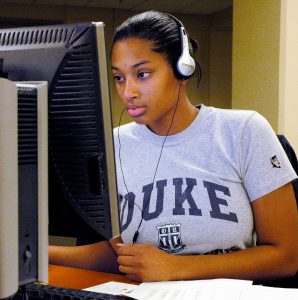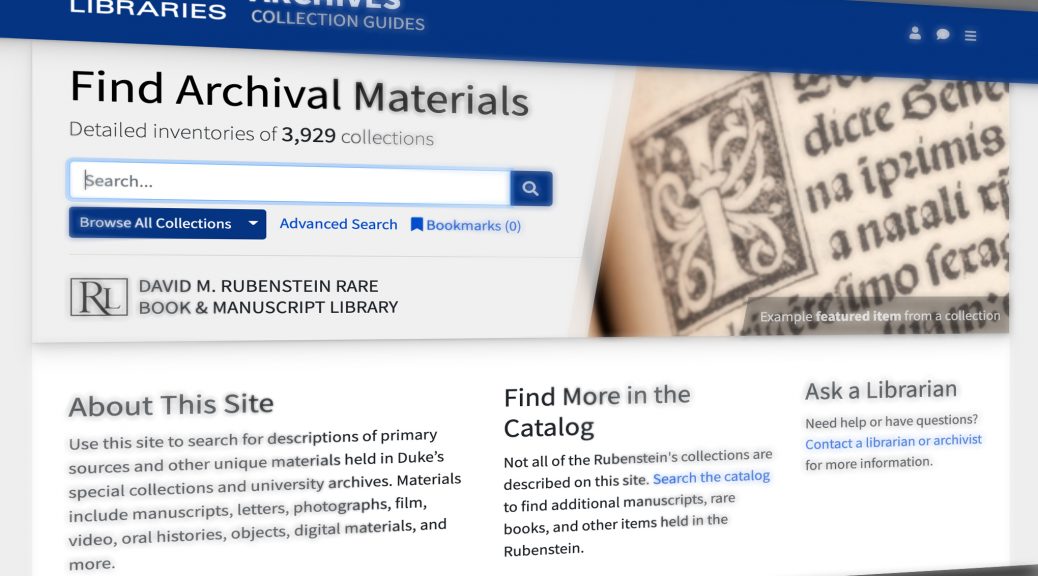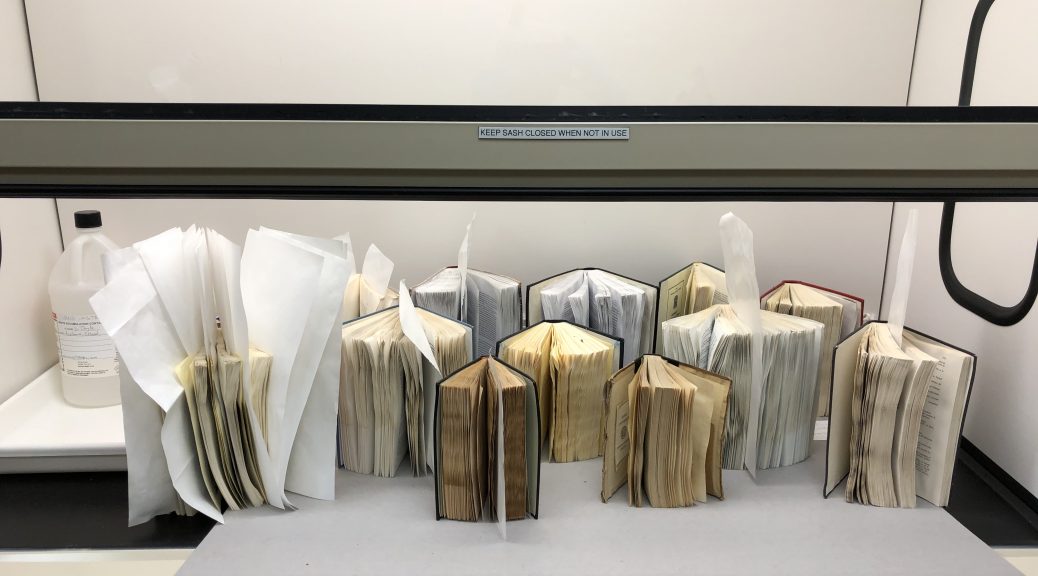Libraries in Times of Crisis
By Aaron Welborn, Director of Communications

Historians often say that history never looks like history when you’re living through it. They probably aren’t talking about years like this.
The global pandemic of 2020 turned everyone’s world upside-down, including the world of higher education. On March 10, Duke joined many other colleges and universities around the country and made the unprecedented but necessary decision to move all classes online for the rest of the spring semester. Events, athletic competitions, and large gatherings of all kinds were canceled. Residence halls and campus buildings were shuttered, including all libraries. As spring stretched into summer, one half of Duke—the health system—was mobilizing every available resource to respond to the public health crisis, while the other half resembled a ghost town.
Then, as if things couldn’t possibly get worse, we woke up to another plague in our midst, starkly symbolized by the killings of George Floyd, Breonna Taylor, and Ahmaud Arbery—a societal sickness of longstanding racial inequities and injustices that demanded urgent action and response at the local, national, and global level.
By the time life returns to any semblance of what it was before, there will be enough books, articles, movies, and stories about the times we’re living in to fill several libraries like ours. And for those of us whose job is to collect, preserve, and share such knowledge and history, our work has never felt more vital.
From the moment classes migrated online to the university’s current plans for a safe and phased return to campus in the fall, the Libraries have played an essential role in keeping teaching and learning going at Duke. We’ve also seized this unprecedented opportunity to reimagine some library services and our responsibilities to collect and highlight the voices of underrepresented groups.
What follows are just some of the examples that demonstrate the many ways our staff pulled together in the face of an unanticipated, historic, and serious public health crisis—and the simultaneous crisis of faith in our most important civic institutions—to keep Duke moving forward.
Supporting Teaching and Learning in a Crisis
As soon as university administrators announced that all instruction was moving online, our staff quickly mobilized to digitize as many course-related materials as possible. At the same time, our online learning experts in Duke Learning Innovation spun up a website and daily e-newsletter to walk faculty through the transition to teaching online. Our librarians also shifted their instruction and research consultations online, assisting students and faculty with finding the materials they needed to complete assignments and research projects remotely. Meanwhile, behind the scenes, we were moving quickly to license even more e-books (in addition to the 1M+ already available in our catalog) and to work with publishers, vendors, and organizations to pursue creative paths to open access for many academic resources.
For example:
-

One of the last items digitized before our closure in March was this historical floorplan of a Duke classroom building. Even before our buildings closed to the public on March 18, library staff were undertaking the herculean task of scanning books, documents, and other materials. Our top priority was to digitize course materials, as well as Rubenstein Library resources that seniors needed for their theses. Meanwhile, staff in our Continuing Resource Acquisitions unit spent much of March working with faculty members to secure digital files of textbooks and other materials to support classwork. They also sorted through resources that publishers temporarily made free to assist with remote learning. From March 10, when Duke made the decision to teach all classes remotely, through the middle of this summer, usage of library e-books, e-journals, and other online resources was up 12 percent over the same period last year.
- Throughout the semester, our librarians and other experts continued to offer consultations and instruction sessions with faculty and students via Zoom and to field online research questions via chat and email. While COVID-19 pushed them away from their customary posts at the library, many of our public services staff remained on-call with expanded hours, ready to lend aid from home.
- Some of the unsung heroes of Duke’s spring 2020 semester were the almost thirty staff members of Duke Learning Innovation, a division of the Libraries that specializes in educational technology, innovative approaches to teaching, and online instruction. In February, when the novel coronavirus still seemed half a world away to most Americans, the DLI team dropped everything to help Duke Kunshan University in China transition 579 undergraduates and more than 100 faculty to online learning. Then, just a few weeks later, they were called upon to replicate that experiment with Duke as a whole, an effort that involved thousands more individuals and classes, scattered across many different time zones and with varying levels of internet access and other technology. The Keep Teaching website they developed offered step-by-step instructions on how to shift courses quickly online. They even put together a video montage (embedded below) celebrating how Duke faculty rose to the challenge. In preparation for the fall semester, DLI launched a new Flexible Teaching website help Duke faculty develop courses that can be successful in any mode of delivery—face-to-face, online or hybrid.
- Meanwhile, the Duke University Archives and Duke University Medical Center Archives were hard at work documenting this unique moment in time. Together, they sent out a call inviting members of the Duke community to submit their COVID-19 stories, which will be permanently preserved for posterity so that future generations may look back on what Duke University President Vincent E. Price dubbed “the greatest experiment in our university’s history.”
Celebrating Our Students, Researchers, and Staff
Students are an indispensable part of our workforce, and without them we could not be one of the top research libraries in the nation. The Libraries are one of the largest employers of students on Duke’s campus, with more than 250 undergraduates and graduate students employed in various positions throughout the year. When the pandemic hit, we were saddened to bid them goodbye, especially those who were about to graduate. But we still celebrated their accomplishments, as well as those of our researchers and library staff who continued to do exemplary work.
For example:
- Staff in Lilly Library realized that five of our graduating student employees had worked in Lilly ever since they arrived at Duke four years ago as wide-eyed first-years. As a way of expressing their appreciation, Lilly staffers wrote profiles of the five students—Sarah, Jessica, Esha, Toni, and Noelle—on our library blog. Although Duke’s commencement this year was virtual, our regard for our student assistants is very real and enduring.

- The Rubenstein Library awarded over thirty travel grants to non-Duke researchers whose work would benefit from visiting the Rubenstein to use our archival collections. Due to widespread travel restrictions and uncertainties about when the library will fully reopen, the travel grants can be used any time through December 2021.
-

Laura Wagner, Project Archivist for the Radio Haiti Archive Laura Wagner, Project Archivist for the Radio Haiti Archive in the Rubenstein Library, was awarded the Philip M. Hamer–Elizabeth Hamer Kegan Award given by the Society of American Archivists (SAA). The award recognizes individuals or institutions that have increased public awareness of archival documents. The Radio Haiti Archive documents much of twentieth-century Haitian history and amplifies the voices of ordinary Haitian people. The collection has already supported the work of many scholars, and Wagner has presented on the project in Haiti and to the Haitian community in the U.S. She has also worked to take the history of Radio Haiti back to the people to whom it belongs by sharing copies of the recordings with organizations, libraries, and archives in Haiti.
Reckoning with Racism, and Extolling Black Excellence
Like many others, we were angered and heartbroken this summer by the police killings of George Floyd, Breonna Taylor, and Rayshard Brooks, as well as the numerous other abuses of power against Black Americans that led to widespread protests and calls to action. The Duke University Libraries are committed to answering that call, and to taking action to confront the longstanding impact of institutional racism within our organization and in our community. Libraries occupy a natural and essential space to seek understanding, have challenging conversations, and together determine what we can do to be a civic-minded and just society. With that in mind, we have already identified a number of actions we will take over the coming months and years, and we will continue to identify others.
For example:
- In the wake of the police killing of George Floyd, the Duke University Libraries issued a statement of our commitment to reckoning with racial injustice. The statement outlines specific actions we will take to expand our cultural competence and combat racism, such as dismantling white privilege in our collections and services, diversifying our staff, and renewing our commitment to documenting and sharing Duke’s complex institutional history. We also appointed a Racial Justice Next Steps Strategic Task Force, with broad representation from across the Libraries, to recommend more ways we can actively contribute as a community to a more just and equitable future for Duke, especially for our Black students, staff, and faculty.
-

In-depth focus groups with Black students revealed insights about their experience of using the Libraries. In the fall of 2019, long before the events of this summer captured the world’s attention, our Assessment and User Experience department conducted several in-depth focus groups with Black students at Duke. We wanted to explore their experience of using the Libraries, whether they viewed us as an inclusive space, and what changes we could make to our spaces, services, and programs to make them feel more supported and included. We shared and published our findings online in March 2020, and we have been analyzing them for steps we can take to improve. This work builds on previous user studies with under-represented student groups that report lower feelings of safety and welcome at Duke, including first-generation college students. A future study is planned in the coming years that will focus on the experiences of international students as well.
- While working remotely, staff in the Rubenstein Library have been blogging and sharing stories from our collections that underscore the long documentary trail of racial injustices against Black people, such as an 1852 diary of a slave trader in the Congo, or the architectural maps of Durham’s urban renewal projects of the 1960s and 1970s that ultimately led to the destruction of the historically black Hayti District. They have also unearthed stories of Black excellence and resilience in the archives, such as a fascinating collection of letters by W. E. B. DuBois in the Charles N. Hunter Papers.

- In response to the Duke community’s call for education as a prelude to action, Heather Martin, Librarian for African and African American Studies, put together an excellent resource guide on anti-racism and Black liberation. It focuses on books, videos, and other resources available through the Duke Libraries. Meanwhile, Danette Pachtner, Librarian for Film, Video, & Digital Media and Women’s Studies compiled a curated list of movies to stream for Juneteenth. And Arianne Hartsell-Gundy, Librarian for Literature and Theater Studies, offered a list of recommended e-books and audiobooks highlighting the Black experience and Black excellence.
Moving Programs Online
Every semester, the Libraries offer a variety of public programs and workshops, ranging from author talks and exhibit openings to tutorials on data visualization and publishing digital projects. Although our physical spaces were closed, we continued to organize and offer a number of programs remotely throughout the spring and summer.
For example:
- In the month after campus shut down, our Center for Data and Visualization Sciences saw a nearly 400 percent spike in viewership of their recorded workshops. The workshops, several years’ worth of which are available on our website, cover everything from making infographics in PowerPoint to managing sensitive data and making scientific research more reproducible.
-

Duke biomedical engineer Rachel Lance, author of “In the Waves” On April 9, we hosted a virtual book talk with Duke biomedical engineer and blast-injury specialist Rachel Lance, author of In the Waves: My Quest to Solve the Mystery of a Civil War Submarine.In the new book, Lance brings readers inside her incredible three-year investigation into the mysterious fate of the HL Hunley, which took her from Duke’s Hyperbaric Medicine facility to the archives and museums around the country. Lance’s research has been featured in Smithsonian, Nature, CNN, and other news outlets, and the book has been named a Scientific American “Recommended Book” and an Amazon “Best Book of the Month” for history.
- Our popular Low Maintenance Book Club, which normally focuses on quick reads for busy Duke students and researchers, shifted into classic novel mode to satisfy the community’s desire for escape reading. Over the course of three monthly meetings, they read and discussed Charles Dickens’ David Copperfield, in anticipation of the upcoming feature film adaptation of the book starring Dev Patel.
Expanding Access to Digitized Content and Collections
Even before the pandemic, we already offered a substantial online library, including millions of e-books, e-journals, databases, streaming videos, and digitized collections, all discoverable through our website. When the university shifted to remote learning, our staff worked quickly with academic publishers to expand access to materials that would support Duke classes, ensuring that students and faculty could utilize digital files of textbooks and other materials they needed.
For example:
 We applied for and received the HathiTrust’s Emergency Temporary Access Service, which offers provisional access to in-copyright titles that match Duke’s print holdings. As a result, Duke students, faculty, and staff could access approximately 40 percent of our print collection online, which they would normally not be able to do. This is in addition to the 6 million public domain and Creative Commons-licensed works that are normally accessible through HathiTrust.
We applied for and received the HathiTrust’s Emergency Temporary Access Service, which offers provisional access to in-copyright titles that match Duke’s print holdings. As a result, Duke students, faculty, and staff could access approximately 40 percent of our print collection online, which they would normally not be able to do. This is in addition to the 6 million public domain and Creative Commons-licensed works that are normally accessible through HathiTrust.
- Capping off a year of planning and six months of development work, we launched a new and completely redesigned discovery and access interface for our special collections in the Rubenstein Library. The site offers information about the contents of nearly 80,000 boxes of material held in the Rubenstein, including manuscripts, letters, diaries, organizational records, photographs, audio visual recordings, oral histories, objects, zines, digital materials, and much more.

This Is Working from Home
At the time of this writing, plans are being finalized for a safe and phased re-opening of the Libraries as Duke resumes classes with students on campus this fall. Although a limited number of essential staff will return to working in our buildings—with masks, daily symptom monitoring, lots of social distance, and frequent handwashing—most of our workforce will continue to work remotely, as we have been doing since mid-March. Running a world-class research library from home—make that 267 individual homes, with all the children and extended family they come with—is no easy feat. But throughout this difficult time, all of us have found new ways to stay connected with and serve the communities that depend on us, even as we stay physically apart to keep everyone healthy and safe. We have also found new ways of keeping our spirits up, pitching in, and reminding ourselves that we’re all in this together.
For example:
-

Library plants in their temporary home at the Library Service Center, where Marvin Tillman dropped by to water them a couple of times each week during the shutdown. On March 18, the last day our physical buildings were open to the public, some of our staff noticed that dozens of plants around the library were in danger of being left behind. Members of our Shipping and Receiving department gathered up some 40 plants large and small, loaded them into a truck, and drove them out to the Library Service Center (LSC), our offsite collections repository. Marvin Tillman, Head of the LSC, has been dropping by to water the plants each week ever since. A few weeks ago, as a small number of library staff began reporting back to work on campus, the plants returned too, none the worse for their long vacation.
- In between assisting Duke faculty with teaching via Zoom and putting out a weekly newsletter with tips and tricks for remote instruction, staff in Duke Learning Innovation shared what they’ve been doing to stay sane and get by while sheltering in place with their families.
-

The author’s three “co-workers” help to manage the strange new normal of working from home. Throughout the spring and summer, our Staff Recognition Committee held a regular “Co-worker of the Week” contest, inviting library employees to submit photos of their pets, children, significant others, roommates, and other “co-workers” who had helped them manage the strange new reality of working from home.
- Even during a global pandemic, ordinary accidents still happen. Case in point: In April, a water pipe burst in the History Department’s building on East Campus, leaking all over books in empty faculty offices, including some library books. A month later, a leaking sprinkler head in the Library Service Center soaked over 250 books before anyone noticed. Luckily, staff in our Conservation Services department rushed to the scene and, with considerable effort, were able to restore all of the books to usable condition. While ill-timed, both accidents offered useful practice in responding to disasters when everyone else is at home.

-

Date crisps, from the Rubenstein Library Test Kitchen While not everyone has been culturing a perfect sourdough starter, many of our staff have found solace in cooking and crafting and sharing the results. Our Stacks Manager in the Rubenstein Library found a 1925 cookbook we had digitized and recreated some nearly century-old recipes for date muffins, date crisps, and date meringues as part of our Rubenstein Library Test Kitchen blog series. Meanwhile, one of our Conservation Specialists took a break from Zoom meetings to practice her hand at creating woven and interlocking books, with handy instructions that are easy for anyone to follow at home.
- By this point, it’s easy to take Zoom for granted. But the technology that helps us endure a pandemic has been over a century in the making. Our digitization experts in the Digital Production Center spent part of their time in quarantine digging into the fascinating history of videotelephony. Meanwhile, we pulled together a virtual background gallery of everyone’s favorite library spaces to help our students and faculty feel like they were back where they belonged.
One of the saddest parts of working remotely is being unable to celebrate major milestones together. This summer five of our outstanding long-time library staff members retired, with over 150 combined years of service among them: Winston Atkins, Preservation Officer (20 years); Beverly Dowdy, Government Documents Processing Coordinator (12 years); Ros Raeford, Head of Resource Description (43 years); Kris Troost, Japanese Studies Librarian and Head, East Asian Collection (30 years); and Sheila Webb, Accounting Invoice Specialist (46 years). Although we were unable to gather together to celebrate them in proper fashion, we wish them the best and appreciate their years of dedication and hard work. Commitment like that is unusual in today’s work environment. But it says something about the kind of place this is. Working in a library comes with many rewards, not least of which is an appreciation for things that last, through good times and bad.



